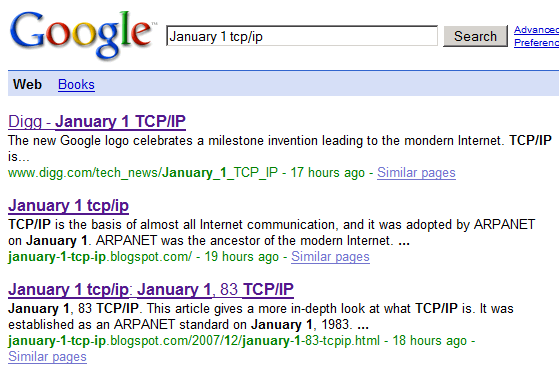Guest post by Ryan Durk
For 24 hours on 1/1/08, Google's logo kindly began linking to my site.
Starting New Years Eve, Google redirected all clicks on its homepage logo to a search for the term January 1 TCP/IP. Recognizing the opportunity to receive immense amounts of traffic (and Google's endorsement), I devised a strategy to rank for this term. My site grabbed rankings at 1, 2, 3 and 4 within 2 hours and maintained spots 1, 3 and 4 until sometime Wednesday. As of right now, it has received over 2000 Diggs and 300,000 page impressions of traffic that converts terribly. More on this later.
The project began like any other: analyzing the search engine result page. Wikipedia ranked some mildly relevant content at 3rd and a Squidoo clone had 2 auto-generated pages in the top 5. Beating Wikipedia would be simple considering "January 1, TCP/IP" was nowhere to be found there. Beating the auto-generated content would be more difficult. Adding to my woes, Yahoo! lags behind Google in indexing, so my link: queries on the sites in question returned blanks.
Note: I should have scrutinized the Google phrase-match SERP. Considering that the auto-generated sites had incoming links with "January 1, TCP/IP" in the anchor text a little digging would have turned the inlinks up.
Not knowing where those links came from wasn't a major issue, particularly because they couldn't have been more than a few hours old. Additionally, I could leverage an authoritative domain and ping for backlinks. I chose Blogspot.com because it met this requirement, because it can handle the traffic, and because it allows AdSense.
But blogging and pinging aggregator services wouldn't be enough. The site had to hold on to the SERP. Topical blogs with authority and blog farms posed substantial threats, and I had no immediate way to gain indexed authoritative links. And I was working against the clock.
The plan:
- Step 1: Register http://january-1-tcp-ip.blogspot.com. Write an SEO'd article and upload.
- Step 2: Social bookmark.
- Step 3: Circular SEO/SEM a la Digg-Google-Digg: Why the site ranked #1-4 for the term Google linked to from its homepage
Circular SEO/SMO:
The idea was to rank Digg itself. Making the bookmark popular would increase Digg's inlinks to it and hopefully grab Digg members off of the SERP. If Digg ranked high, Digg members would Digg it out of vanity/curiosity (or at least a small percentage would). Digg's trustrank, freshness, relevance and authority would keep the bookmark at #1. I just had to get the bookmark in the top 5 and the Digg users would take care of the rest. After social bookmarking the bookmark itself, it grabbed rank 3 for the term and made the Digg front page 3 hours later. Google's immediate indexing of Digg's internal links was all that mattered, which increased as users Dugg the site.
In short, Digg members found the bookmark by clicking the Google logo, which was ranked so highly because Digg members found the bookmark by cl… And in the middle of all of this was the real target: the average Google searcher wanting to know why Google was endorsing "January 1 TCP/IP" SERP.
Four Listings:
As a side-benefit of using Digg and Blogspot, I had some domain-level authority to play around with. I wrote another article and added a link with the keyword phrase in its anchor text. Pinged it and voila, ranks 1, 2 and 3. After Digging the new article I held the top four links for the target keyphrase.
Copycats:
If you spent some time on the SERP yesterday, you saw sites like "january-1-tcpip.blogspot.com", "january-1-tcp-ip-123.blogspot.com" and "january-1-tcp--ip.blogspot.com," none of which were created by me. The pages are hosted on Blogspot since my work with Digg established blogspot.com as a relevant domain for the keyphrase, which helped them rank in the top 10. Additionally, an SEO was occasionally able slide into rank 2 by persistently adding new Digg bookmarks optimized for the keyphrase.
Monetization:
The site received over 300,000 unique hits of traffic converting at below half of a percent.
Mistakes:
- Not using the traffic to promote other sites.
- Writing for Google and not the users. This bookmark had the potential to become the number 1 most Digged of all time.
- AdSense: non-optimized layout, using AdSense at all.
- SERP defense. I mentioned the site had rankings 1-4 but now only has 1-3 (or 1,3,4 depending on the data center).
The result of clicking on the Google logo:



